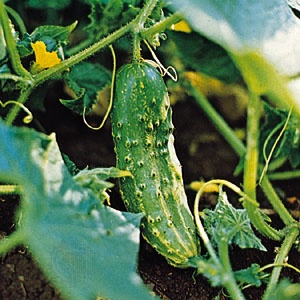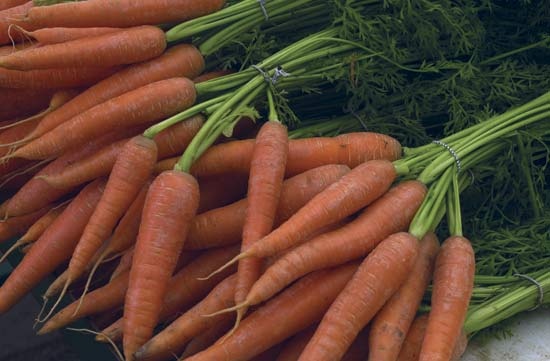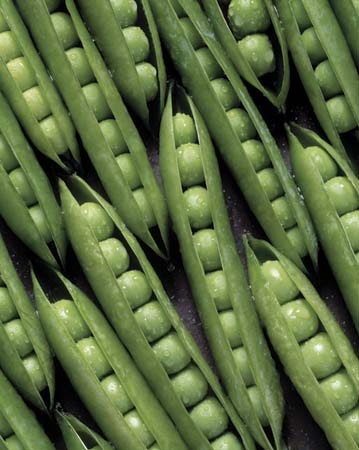vegetable
food
 in the broadest sense, any kind of plant life or plant product, namely “vegetable matter”; in common, narrow usage, the term vegetable usually refers to the fresh edible portion of a herbaceous plant—roots, stems, leaves, flowers, or fruit. These plant parts are either eaten fresh or prepared in a number of ways.
in the broadest sense, any kind of plant life or plant product, namely “vegetable matter”; in common, narrow usage, the term vegetable usually refers to the fresh edible portion of a herbaceous plant—roots, stems, leaves, flowers, or fruit. These plant parts are either eaten fresh or prepared in a number of ways.A brief treatment of vegetables and vegetable farming follows. For information on particular vegetables, see carrot, potato, and so on. For treatment of vegetable cultivation, see vegetable farming. For treatment of the nutrient composition and processing of vegetables, see vegetable processing.
 Virtually all of the more important vegetables were cultivated among the ancient civilizations of either the Old or the New World. Some, such as the cucumber, potato, sweet corn (maize), and onion, have been so changed by cultivation that their wild ancestors can no longer be identified with certainty.
Virtually all of the more important vegetables were cultivated among the ancient civilizations of either the Old or the New World. Some, such as the cucumber, potato, sweet corn (maize), and onion, have been so changed by cultivation that their wild ancestors can no longer be identified with certainty. Vegetables are usually classified on the basis of the part of the plant that is used for food. The root vegetables include beets, carrots, radishes, and turnips. Stem vegetables include asparagus and kohlrabi. Among the edible tubers, or underground stems, are potatoes. The leaf and leafstalk vegetables include brussels sprouts, cabbage, celery, lettuce, rhubarb, and spinach. Among the bulb vegetables are garlic, leeks, and onions. The head, or flower, vegetables include artichokes, broccoli, and cauliflower. The fruits commonly considered vegetables by virtue of their use include beans, cucumbers, eggplant, okra, peas, sweet corn, squash, peppers, and tomatoes.
Vegetables are usually classified on the basis of the part of the plant that is used for food. The root vegetables include beets, carrots, radishes, and turnips. Stem vegetables include asparagus and kohlrabi. Among the edible tubers, or underground stems, are potatoes. The leaf and leafstalk vegetables include brussels sprouts, cabbage, celery, lettuce, rhubarb, and spinach. Among the bulb vegetables are garlic, leeks, and onions. The head, or flower, vegetables include artichokes, broccoli, and cauliflower. The fruits commonly considered vegetables by virtue of their use include beans, cucumbers, eggplant, okra, peas, sweet corn, squash, peppers, and tomatoes.Most fresh vegetables have a water content in excess of 70 percent, with only about 3.5 percent protein and less than 1 percent fat. Vegetables, however, are good sources of minerals, especially calcium and iron, and vitamins, principally A and C.
Modern vegetable farming ranges from small-scale production for local sale to vast commercial operations utilizing the latest advances in automation and technology. Most vegetables are planted by seeding in the fields where they are to be grown, but occasionally they are germinated in a nursery or greenhouse and transplanted as seedlings to the field. During the growing season herbicides, pesticides, and fungicides are commonly used to inhibit damage by weeds, insects, and diseases, respectively. Harvesting operations are usually mechanized in well-developed nations, but the practice of harvesting by hand is still employed in some areas or is used in conjunction with machine operations. Another concern of the vegetable farmer is postharvest storage, which may require refrigerated facilities.
Vegetables may be washed, sorted, graded, cut, and packaged for sale as fresh products. Fresh vegetables are subject to quick aging and spoilage, but their storage life can be extended by such preservation processes as dehydration, canning, freezing, fermenting, or pickling.
- TIROS
- Tirpitz, Alfred von
- Tirso de Molina
- Tirthankara
- Tiruchchirappalli
- Tirukkural
- Tirunelveli
- Tirupati
- Tiruppur
- Tiruvalluvar
- Tiryns
- Tischbein, Johann Heinrich Wilhelm
- Tischendorf, Konstantin von
- Tiselius, Arne
- Tisha be-Av
- Tiso, Jozef
- Tissaphernes
- Tisserand, Félix
- Tissot, James
- tissue
- Tissue Affected by Phosphoinositide Second
- tissue culture
- tissue engineering
- Tista River
- Tisza, István, Gróf